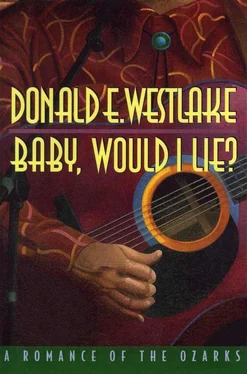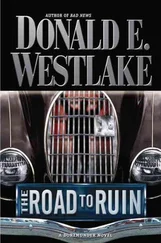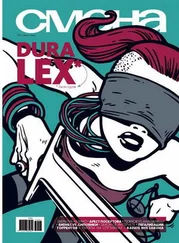Soandso was a somewhat hefty, tall woman dressed entirely in vermilion, head to wrist to toe, covered with bugle beads. Her hair, of which she had a lot, was a clashing orange in color, and the electric guitar she carried displayed most of the other shades of the red section of the spectrum. Her eyelashes were long enough to hang laundry on, her smile would light Central Park, and when she thanked everybody for the applause that had welcomed her, she had a voice like a backhoe.
But it was powerful, all right, and even melodic when used for purposes of singing. Soandso was a belter; she stood well back from the microphone and delivered two songs about hard times on the field of love. Both songs were clearly well known to the crowd and well liked by them. After the applause following the second, Soandso said, “You’re all gonna see Ray Jones in a little while,” and that got its own rush of fervent applause, following which Soandso said, “Ray’s havin more than his share of troubles these days, but he’s always been a good friend to me and he’s a fine songwriter. I’d like to dedicate this to Ray and wish him the best.” And she did a gravelly honky-tonk version of the song Ray had sung to Sara in the bus: “It’s Time to Write Another Love Song (This Time, The Song’s for You).”
Big applause. Soandso blew kisses, waved her guitar, dis-attached the guitar from the amplifiers, and jounced away, revealing a behind that looked like the world’s largest candy apple. Mr. Frock Coat bounded back and introduced somebody else, and Sara spent her time watching the audience, trying to think about Ray Jones and his trial — trials, there was also the income-tax thing — and his relationship with his audience, these people here. What did it mean? What could she make it mean, in a piece for Trend , that wouldn’t make Jack, or Hiram Farley, throw up?
Then at last, Ray Jones was introduced, and he got a whole lot of applause. When it died down, he said, “You know, Branson’s my home, been my home for a while now, and if I feel like maybe I can do something to help Skaggs Community Hospital, it’s mostly a selfish act, because it’s my community and my community hospital, and I can’t tell you how happy I am, as a local boy, that they are there. So thank you all for supporting their good work. And now” — strum the guitar — “I’d like to sing about my favorite girl. Anybody out there with that name? My favorite girl’s name?”
Squealing, absolute squealing, from the crowd. Girls and women of all ages jumped up and down, waving their hands over their heads, yelling, “Me! Me!”
And yelling something else, too: a name. Their own name, it must be, and Ray Jones, like so many songwriters before him, must have written a song to a particular girl’s name. A popular name among the country fans, from the agitation in the crowd. What were they shouting?
Fllrrumm went the guitar, and Ray Jones sang:
Tiff-fa-nee, you’re pretty as a picture.
Tiff-fa-nee, you’re sweet as berry jam.
Anywhere you are, I’ll he right witcha.
Anywhere you go, that’s where I am.
Tiff-fa-nee, you’re good as golden apples.
Tiff-fa-nee, you’re nice as apple pie.
In your eyes, the light of lovely chapels.
In your eyes, the blue of heaven’s sky.
When we met, I heard your name so sweetly,
Ringing like a bell, a chandelier.
You know you have captured me completely.
You know I will always be sincere.
Tiff-fa-nee, your voice is like a robin,
Tiff-fa-nee, you move with such sweet grace,
I can feel my heart within me throbbin’,
Every time I gaze upon your face.
When we met, I thought you were above me.
Your sweet lips were open in a smile.
Tiffany, if you could only love me,
How I’d love to walk you down the aisle.
Tiff-fa-nee, if we could live forever,
Tiff-fa-nee, I’d live life by your side,
Beautiful, you know I’d leave you never,
Come with me, my love, and be my bride.
Sara couldn’t make a sociological statement out of that one at all.
Monday, the trial got into high gear. Sara sat between Cal and Honey Franzen again, watching, remembering, wishing she could take notes but afraid it might just be the gesture to drive Jolie’s forbearance beyond endurance. And anyway, what was happening was memorable enough.
Over vociferous defense objections, the jury was shown photos of the dead Belle Hardwick, as well as of the scrubby lakeside land where the murder had taken place and the bloodstained interior of the red Acura SNX. The prosecution wanted to bus the jury over to the actual murder site — on a Ride the Ducks? — but even Judge Quigley realized that was going too far, both figuratively and literally, and ixnayed it.
Still, the prosecution made its approach clear from the opening salvo. Their two-pronged attack was first to demonstrate the absolute depravity of the crime and second to establish the absolute depravity of Ray Jones, thus linking him to the crime by making him the only person in the vicinity vile enough to have committed it. Since all they had in real terms was circumstantial evidence, and rather shaky circumstantial evidence at that, this was clearly their wisest approach. As the old legal dictum has it: If the facts are with you, pound the facts; if the facts are against you, pound the table. The prosecution pounded the table.
There was a lot of stuff they wanted to pound the table with, and the defense blocked them at every turn. They wanted to bring in the Ray Jones tax problem. They wanted to introduce supposedly cynical or unchristian lyrics from his songs. They wanted to talk about his marital life. They wanted to talk about a previous legal record that seemed to consist of the various things that can happen when you combine alcohol with automobiles. They even wanted to mention a decades-old song plagiarism suit against Ray that had been dismissed as frivolous and without merit the first time it had reached a court.
Every time one of these unacceptable side roads appeared on the horizon, Warren Thurbridge was at once on his feet, objecting loudly, eloquently and unceasingly, drowning out the offending matter, seeing to it by his volume and vocabulary that not one extraneous syllable tainted the jurors’ ears. And each time, Judge Quigley would pound her gavel and order the jury removed while she consulted with the attorneys at the bench, and the technician running the defense team’s video camera would switch it off, not to switch it back on until the jury returned.
The jury did a lot of marching back and forth Monday morning and the video technician did a lot of switching off and on. Sara, watching all this, thought there wasn’t going to be much tape for the shadow jury to look at later today, which made her realize she wanted desperately, hungrily, voraciously to watch the shadow jury in action.
At lunch, which she was permitted to take with the defense team in the conference room of Warren’s offices, presumably because all strategy had already been worked out and nothing of dangerous importance was likely to be said over the ham-and-American sandwiches and really sweet coleslaw, Sara began to wheedle Cal for permission to sit in on today’s shadow jury session, “even for just one minute, just to get the idea of it.”
At first, Cal didn’t even want to broach the subject with the lawyers in the room, not wanting his head bitten off, but then Sara said, “Ask Ray. If he says yes, they’ll have to go along with him. If he says no, I’ll give up.”
Читать дальше







